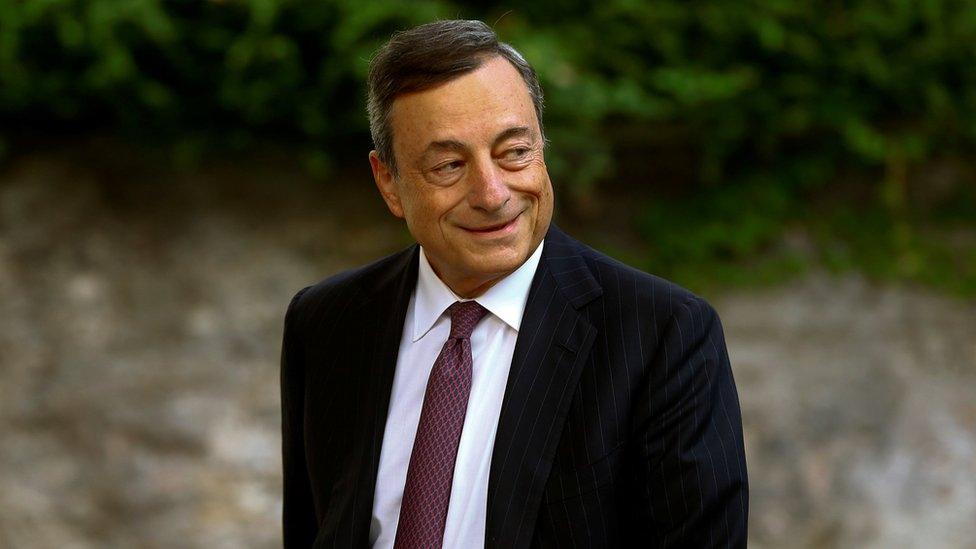ECB chief Draghi: QE has made economies more resilient
- Published

European Central Bank President Mario Draghi has said unconventional policies like quantitative easing (QE) have been a success both sides of the Atlantic.
QE was introduced as an emergency measure during the financial crisis to pump money directly into the financial system and keep banks lending.
A decade later, the stimulus policies are still in place, but he said they have "made the world more resilient".
But he also said gaps in understanding these relatively new tools remain.
As the economic recovery in the eurozone gathers pace, investors are watching closely for when the ECB will ease back further on its 60bn euro (£55bn) a month bond-buying programme.
Central bankers, including Mr Draghi, are meeting in Jackson Hole, Wyoming, later this week, where they are expected to discuss how to wind back QE without hurting the economy.
On Monday, a former UK Treasury official likened the stimulus to "heroin" because it has been so difficult to wean the UK, US and eurozone economies off it.
In a on Wednesday, Mr Draghi defended QE and the ECB's policy of forward guidance on interest rates.
"A large body of empirical research has substantiated the success of these policies in supporting the economy and inflation, both in the euro area and in the United States," he said.
The ECB buying relatively safe assets such as government bonds means that banks can lend more and improve access to credit for riskier borrowers, Mr Draghi said.
He added: "Policy actions undertaken in the last 10 years in monetary policy and in regulation and supervision have made the world more resilient. But we should continue preparing for new challenges."
'Heroin'
Critics of QE argue it has inflated asset bubbles and stoked inequality by rewarding the asset-rich while punishing savers.
Lord Macpherson, who was permanent secretary to the Treasury when the Bank of England started QE in 2009, tweeted on Monday: "QE like heroin: need ever increasing fixes to create a high. Meanwhile, negative side effects increase. Time to move on."
The Bank of England's balance sheet swelled to £500bn last year, while the US Federal Reserve held $4.2 trillion (£3.3tn) of assets - which it is now looking to cut down.
The ECB's massive bond-buying programme, which started in March 2015, is expected to top 2tn euros by the year end.
Mr Draghi's comments came as a survey showed continued eurozone businesses growth in August, raising further questions about how much longer the stimulus is needed.
The fastest rise in manufacturing exports in six-and-a-half years helped to offset a mild slowdown in services growth, according to the .
- Published20 July 2017
- Published1 November 2022
- Published8 June 2017